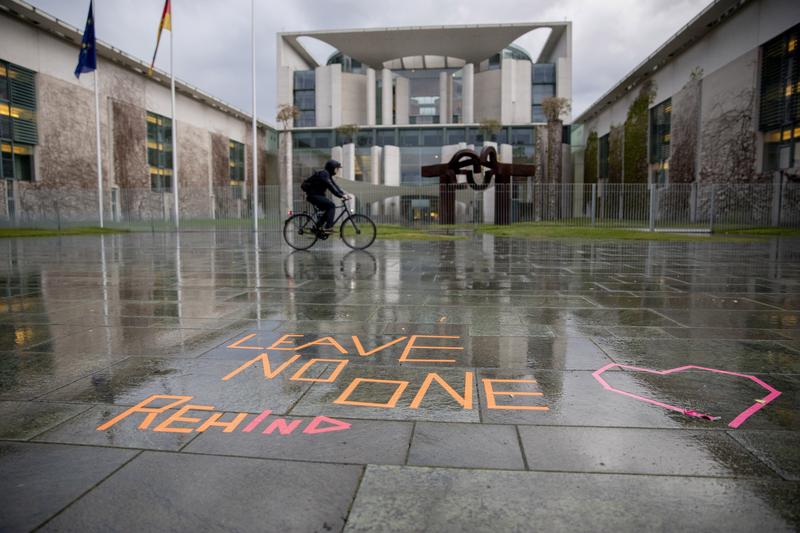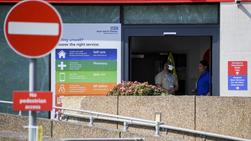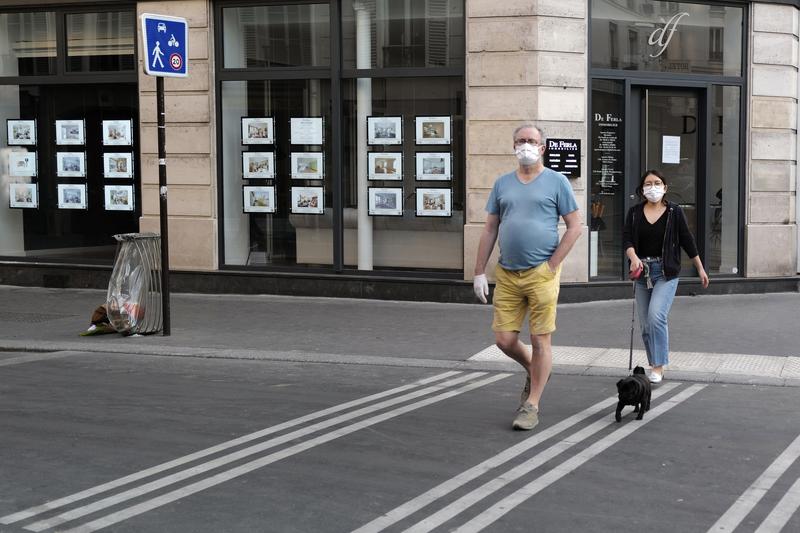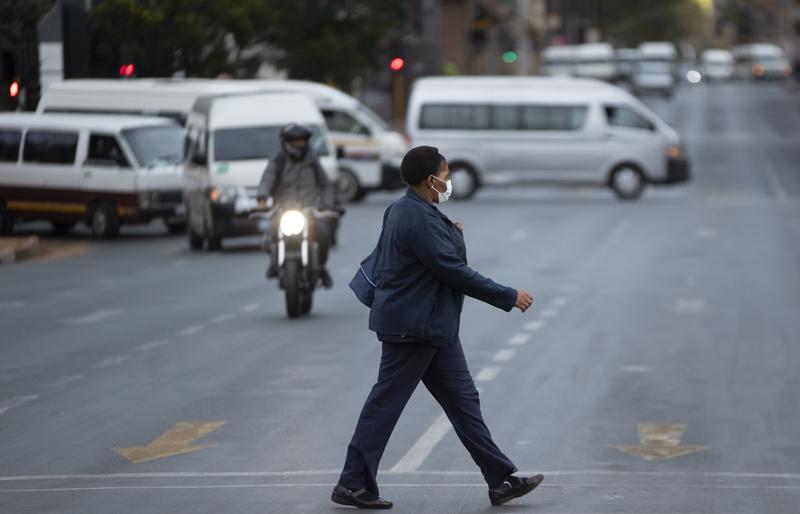 "Leave no one behind" is written on the floor in front of the Federal Chancellery in Berlin, April 13, 2020. (CHRISTOPH SOEDER / DPA VIA AP)
"Leave no one behind" is written on the floor in front of the Federal Chancellery in Berlin, April 13, 2020. (CHRISTOPH SOEDER / DPA VIA AP)
LONDON / PARIS / AMSTERDAM / ROME / LISBON / MADRID / JOHANNESBURG / MONROVIA/ NEW YORK / ACCRA / FRANKFURT - Senior politicians in Germany have begun debating a potential easing of restrictions imposed over the coronavirus epidemic ahead of a meeting with Chancellor Angela Merkel on Wednesday.
On Monday, Merkel and premiers of Germany’s 16 states expect to get recommendations from the German National Academy of Sciences that the chancellor has said will weigh heavily in considerations for a possible loosening in movement and social distancing rules in place since around mid-March.
Germany’s number of confirmed coronavirus infections has risen by 2,537 to 123,016, data from the Robert Koch Institute (RKI) for infectious diseases showed on Monday
The discussion takes place as the number of new infections and deaths declines in Germany, which has weathered the pandemic better than European neighbours Italy, Spain and France.
Germany’s number of confirmed coronavirus infections has risen by 2,537 to 123,016, data from the Robert Koch Institute (RKI) for infectious diseases showed on Monday.
That was lower than a 2,821 increase reported on Sunday, and marked the third decline after four days of increases.
The reported death toll has risen by 126 to 2,799.
But Germany’s export-driven economy - Europe’s largest - has been hit hard and is estimated to contract 9.8 percent in the second quarter, the biggest decline since records began in 1970 and more than double the decline seen during the global financial crisis in 2009.
Merkel will discuss the recommendations of the science academy with her cabinet on Tuesday. On Wednesday, she will hold a video conference with the state governors to discuss a possible path out of the lockdown and how to manage the recession it is expected to cause.
Over the Easter weekend, Armin Laschet, conservative governor of Germany’s most populous state of North Rhine-Westphalia, sent recommendations from an expert panel from his own state to Merkel and his fellow premiers. He has stressed the importance of easing restrictions.
Speaking to broadcaster ZDF on Sunday evening, Laschet said that small retailers, for example, could potentially reopen following the model in place for bakeries with only two customers at a time.
“Why shouldn’t this also work for other shops,” he said, calling for “a responsible return to normalcy”.
Other politicians, like Dietmar Woidke, governor of Brandenburg, have called for a more cautious approach to avoid the risk of negating the gains Germany has made in combating the virus.
Global toll
Confirmed COVID-19 cases worldwide topped 1.8 million on Sunday morning US Eastern Time, according to the Center for Systems Science and Engineering (CSSE) at Johns Hopkins University. The fresh figure reached 1,800,791 with 110,052 deaths as of 11:50 am local time (1550 GMT), the CSSE said.
Europeans observed a less festive Easter Sunday, as their attention is still grabbed by the coronavirus, which, according to the data from the World Health Organization, has infected 839,257 people across Europe. The downward trend, however, shines a ray of hope on the anti-virus fight, but European countries are cautious in easing restrictions too soon.
Seventy coronavirus vaccines are in development globally, with three already being tested in human trials, the World Health Organization (WHO) said. The furthest along in the clinical process is an experimental vaccine developed by Hong Kong-listed CanSino Biologics Inc. and the Beijing Institute of Biotechnology, which is in phase two. The other two being tested in humans are treatments developed separately by US drugmakers Moderna Inc. and Inovio Pharmaceuticals Inc., according to a WHO document.
 General view of the St Thomas' Hospital where Britain's Prime Minister Boris Johnson has been admitted, in London, April 11, 2020. (ALBERTO PEZZALI / AP)
General view of the St Thomas' Hospital where Britain's Prime Minister Boris Johnson has been admitted, in London, April 11, 2020. (ALBERTO PEZZALI / AP)
UK
British Prime Minister Boris Johnson left hospital on Sunday and thanked staff for saving his life from COVID-19, but his government was forced to defend its response to the coronavirus outbreak as the national death toll passed 10,000.
The sombre milestone came after Britain reported two days in a row of hospital deaths increasing by more than 900. Friday’s death toll of 980 surpassed the highest daily total recorded in Italy, the hardest-hit country in Europe so far.
Britain's gross domestic product (GDP) could fall by 25 to 30 percent in the second quarter amid the COVID-19 pandemic, British Finance Minister Rishi Sunak said during the weekend, according to local media reports.
Sunak made the remarks when discussing with his colleagues about the virus's impact on the economy as members of the cabinet pressed for easing lockdown restrictions next month.
William’s message came on a day when the COVID-19 death toll in hospitals across the United Kingdom passed 10,000
Prince William has said Britain is at its best in a crisis, his office said on Sunday, the latest in a series of messages from the royal family seeking to galvanise the nation during the coronavirus pandemic.
Queen Elizabeth has twice addressed Britons in the past week, while heir-to-the-throne Prince Charles, who tested positive for the new virus, has also issued several video and audio messages since he recovered.
ALSO READ: Britain's William, Kate surprise school children with video call
William’s message came on a day when the COVID-19 death toll in hospitals across the United Kingdom passed 10,000.
“I think Britain is at its best when faced with a crisis,” the queen’s grandson said during a call with a community charity in northern England that runs a food bank and has been delivering hot meals to isolated people.
“We all pull together and that community spirit comes rushing back quicker than anything else,” William said on the call, according to his office at Kensington Palace.
William, who is second-in-line to the throne after his father Charles, has become the patron of the National Emergencies Trust (NET) for 2020, the palace said.
France
The death toll in France from the coronavirus outbreak rose at a slightly slower pace on Sunday than a day earlier, the French public health authority said, adding that the lockdown was producing its first effects.
“This data confirms that the epidemic keeps going on in our country in a dynamic way and it continues to hit us hard,” the health authority said in a statement.
 A couple wearing protective masks walks their dog front of a closed shop during a nationwide confinement to counter the COVID-19, in Paris, April 12, 2020. (FRANCOIS MORI / AP)
A couple wearing protective masks walks their dog front of a closed shop during a nationwide confinement to counter the COVID-19, in Paris, April 12, 2020. (FRANCOIS MORI / AP)
“Confinement measures, the application of barrier gestures, physical distancing for a minimum of 1 meter, social distance and a drastic reduction in contacts produce their first effects,” it added.
The death toll, which includes data from hospitals and nursing homes, rose by 561 to 14,393 as of Sunday. It increased by 635 on Saturday.
The health authority said it was important to remain vigilant because hospitals were still taking in a very large number of patients.
Netherlands
The number of confirmed coronavirus cases in the Netherlands has topped 25,000, health authorities said on Sunday, with the number of deaths rising by 94 to 2,737.
The Netherlands’ National Institute for Health reported 1,188 new infections over the past 24 hours, taking the total to 25,587
The Netherlands’ National Institute for Health (RIVM) reported 1,188 new infections over the past 24 hours, taking the total to 25,587.
The rate of increase in infections and deaths has slowed for several days helped by social distancing measures.
Portugal
The coronavirus outbreak spread further into Portuguese care homes over the Easter weekend, with 100 new cases of COVID-19 reported in a single residence and care homes accounting for around one in eight of the country’s 504 deaths.
The death toll and 16,585 recorded cases are still a small fraction of the numbers in neighbouring Spain, but officials fear the disease could spread rapidly through care homes as it has in other parts of Europe.
The government announced on 30 March that tests were to be made available to all care workers and suspected cases in homes across the country, but the distribution is still underway.
Italy
Deaths from the COVID-19 epidemic in Italy rose by 431 on Sunday, down from 619 the day before, and the number of new cases slowed to 4,092 from a previous 4,694.
The tally of deaths was the lowest daily rise since March 19.
The total death toll since the outbreak came to light on Feb 21 rose to 19,899, the Civil Protection Agency said, the second highest in the world after that of the United States.
The number of officially confirmed cases climbed to 156,363, the third highest global tally behind those of the United States and Spain.
There were 3,343 people in intensive care on Sunday against 3,381 on Saturday — a ninth consecutive daily decline.
Of those originally infected, 34,211 were declared recovered against 32,424 a day earlier.
READ MORE: Europe’s virus toll in Italy and UK keeps focus on lockdowns
Spain
Spain’s Prime Minister Pedro Sanchez said on Sunday any further loosening of the country’s lockdown restrictions would depend on more progress in the fight against the coronavirus, a day before some companies plan to reopen their doors.
The country’s overnight death toll from the infection rose for the first time in three days on Sunday, to 619, health ministry data showed, bringing the cumulative toll to 16,972. Confirmed cases increased by around 2.6 percent to 166,019.
Tough lockdown measures have helped bring down a spiralling death rate that reached its peak in early April. New deaths reported on Saturday were the lowest in 19 days while the increase of confirmed cases has roughly halved from a week ago.
Russia
Russia on Monday reported 2,558 new cases of the novel coronavirus, a record daily rise, bringing its overall nationwide tally to 18,328.
Russia’s coronavirus crisis response centre said that 148 people diagnosed with the virus have died so far, an overnight rise of 18.
US
The number of COVID-19 cases in the United States topped 550,000 on Sunday afternoon, according to the Center for Systems Science and Engineering (CSSE) at Johns Hopkins University.
The fresh figure reached 550,016 with 21,733 deaths as of 5:30 pm (2130 GMT), according to the CSSE.
The state of New York recorded 189,020 cases, the most in the country, with a death toll of 9,385. New Jersey reported 61,850 cases and 2,350 fatalities. Michigan, Pennsylvania, Massachusetts, California, Illinois and Louisiana have each reported over 20,000 cases, according to the tally.
Muriel Bowser, mayor of Washington DC, said on Sunday coronavirus cases in the US capital will likely peak in June.
"We, like all cities and states around the country, are looking at various models to see what they tell us about when our medical surge will happen," Bowser said in an interview on Fox News. "And we expect that could happen in Washington DC in June."
 A health worker wearing face masks to protect against coronavirus, walks on the street in downtown Johannesburg, South Africa, April 9, 2020. (THEMBA HADEBE / AP)
A health worker wearing face masks to protect against coronavirus, walks on the street in downtown Johannesburg, South Africa, April 9, 2020. (THEMBA HADEBE / AP)
South Africa
South Africa on Sunday reported a further 145 cases of the coronavirus, taking the total number in the country to 2,173, a statement from the Health ministry said.
The statement did not provide any update on the number of deaths, which rose to 25 on Saturday.
Liberia
A coronavirus lockdown in Liberia’s capital Monrovia got off to a chaotic start at the weekend, as some police officers used truncheons against residents who had ventured outside in search of provisions.
The lockdown is a test of the Liberian authorities’ vows to improve on their handling of a quarantine of a Monrovia slum during the Ebola outbreak in 2014
Confusion reigned across much of Monrovia, a city of more than 1 million people, with many having heard, erroneously, via social media that the government had ordered a 3 pm to 6 am curfew rather than a full lockdown.
Many residents had voiced anger in the run-up to the lockdown ordered by President George Weah, which they said would do more harm than good in a country where more than half the population lives in poverty.
“Corona is not going to kill many people. It is hunger that will kill many Liberians,” said Jettroy Kolleh, a student, as he stood on Thursday outside a bank in Monrovia, where dozens of people had queued in close proximity to withdraw money.
The lockdown is a test of the Liberian authorities’ vows to improve on their handling of a quarantine of a Monrovia slum during the Ebola outbreak in 2014, which sparked riots by residents lacking food and water.
Liberia has so far confirmed at least 48 cases of the coronavirus, including five deaths.
Ghana
Ghana's confirmed COVID-19 cases jumped to 566 with 158 additional cases recorded, the Ghana Health Service (GHS) said late Sunday.
The authorities attributed the rapid jump in the number of confirmed cases to the measures of detection instituted through enhanced contact tracing and testing across the country.
In all, Ghanaian health authorities have tested 37,954 persons, with 566 turning out positive, said the release.
Out of the total number of cases, eight of them have passed away, while four of them have successfully recovered and tested negative for the virus.
President Nana Addo Dankwa Akufo-Addo announced earlier on Sunday the extension of the ban on public gatherings across the country.


